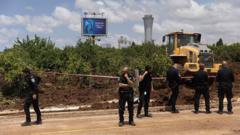Iranian officials express willingness to negotiate while critiquing inconsistent U.S. messages and affirming their rights to nuclear enrichment.
Iran's Foreign Minister Responds to U.S. Nuclear Negotiation Signals

Iran's Foreign Minister Responds to U.S. Nuclear Negotiation Signals
Tehran is set to engage in further nuclear talks despite unclear U.S. demands.
April 16, 2025, 7:11 p.m. ET - Amidst divergent signals from the Trump administration regarding its intentions for Iran's nuclear ambitions, Iranian officials reiterated their commitment to engage in negotiations. Foreign Minister Abbas Araghchi announced that a second round of discussions between Tehran and U.S. representatives, including special envoy Steve Witkoff, will take place in Rome this coming Saturday.
Following a meeting in Oman last Saturday where about two hours of indirect and direct talks occurred, both sides reported a constructive atmosphere. Despite expressing concerns about the U.S.'s shifting stance—oscillating between calls for the limitation of Iran’s nuclear capabilities and demands for complete dismantlement—Mr. Araghchi indicated that Iran will remain poised and focused during the discussions. He emphasized the importance of discerning Washington’s true objectives during private negotiations.
"We will participate in negotiations calmly and coolly without being influenced by any faction," Araghchi affirmed in a media statement. He maintained that Iran's nuclear enrichment, primarily aimed at peaceful energy, is a "nonnegotiable" issue, even as Iran demonstrated willingness to build trust in addressing concerns surrounding its nuclear program.
The Trump administration appears fragmented in its approach, with internal debates on the optimal demands to place on Iran. President Trump has publicly stated a desire to prevent Tehran from weaponizing its nuclear program, a stance that reflects ongoing tensions in these high-stakes negotiations.
Following a meeting in Oman last Saturday where about two hours of indirect and direct talks occurred, both sides reported a constructive atmosphere. Despite expressing concerns about the U.S.'s shifting stance—oscillating between calls for the limitation of Iran’s nuclear capabilities and demands for complete dismantlement—Mr. Araghchi indicated that Iran will remain poised and focused during the discussions. He emphasized the importance of discerning Washington’s true objectives during private negotiations.
"We will participate in negotiations calmly and coolly without being influenced by any faction," Araghchi affirmed in a media statement. He maintained that Iran's nuclear enrichment, primarily aimed at peaceful energy, is a "nonnegotiable" issue, even as Iran demonstrated willingness to build trust in addressing concerns surrounding its nuclear program.
The Trump administration appears fragmented in its approach, with internal debates on the optimal demands to place on Iran. President Trump has publicly stated a desire to prevent Tehran from weaponizing its nuclear program, a stance that reflects ongoing tensions in these high-stakes negotiations.






















